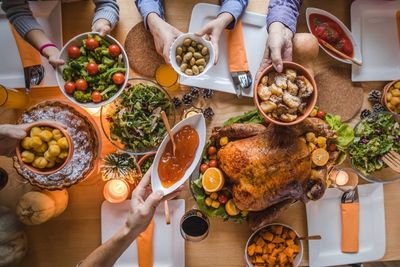Thanksgiving is almost here, and the December holidays are close on its heels. I don’t know about you, but I get a little stressed out about all the feasts, parties, cookies, and other high-calorie pitfalls that lie ahead. I try to eat healthfully all year long, and that can be hard in this season when there’s so much delicious food everywhere I go.
Here are the best strategies I’ve come up with for navigating the food-related challenges that lie ahead. I’m going to try them out this year. Who’s with me?
1. Just Give Up
I’m serious. Let’s admit it: We’re going to eat. So, let’s not pile a heaping spoonful of guilt onto our plates along with the “roast beast,” sweet potatoes, cranberry sauce, pumpkin and apple pie, pizzelles, sugar cookies, and gingerbread.
Eating these delicious treats doesn’t make us bad people. And if we’re going to eat them anyway, the least we can do is enjoy ourselves…instead of judging ourselves (and each other).
And, in fact, the more we take time to really savor our food, the more likely we are to eat more moderate, reasonable portions.
If you’ve mostly been eating sensibly the rest of the year, overdoing it a little for just one month is not going to torpedo your health.
2. It’s About Quality, Not Just Quantity
At my family gatherings we always have so much food, we don’t know what to do with it. There’s enough to feed three times the number of people.
Given all the menu options laid out on the dining room table, let’s try to focus on the ones that are most nutrient-dense. Good sources of protein and fiber will fill us up much faster than carbohydrates and fats. So let’s really help ourselves to the roast beast, salad, and string beans.
I’m not saying we should skip the mashed potatoes, stuffing, and dessert. Heck no! That’ll just leave us feeling deprived and hangry! But maybe we’ll eat less of them because we don’t have room after all that dense protein.
And by the way: if you have more leftovers than you can reasonably consume — or extra cans of cranberry sauce, pumpkin puree, or gravy, etc. — consider donating this abundance to a local food pantry. I’m sure there are people in your community who’d be very grateful.
3. Take a Walk
Going for a walk after a big meal makes us feel better. It can help regulate our blood sugar, improve our digestion, boost our mood, and improve our sleep quality. And yes, it also burns off some calories. It may even support weight loss, help regulate your blood pressure, and reduce your risk of heart disease.
It’s also a nice thing to do as a family. Bundle up, go outside, and stroll around the block (or wherever strikes your mood). Savor the cool air. Sing carols. Reminisce about the holidays of yesteryear. It could turn into a really nice family tradition.
4. Don’t Starve Yourself
You might feel tempted to eat less before or after a big meal, just to balance out the calories. But that’s an almost sure-fire recipe for overeating. It can make you feel deprived, make your blood sugar crash, and leave you so ravenous that you’ll eat more than enough to make up for the calories you missed.
Don’t go into that holiday feast ready to devour everything that isn’t nailed down.
5. Repeat #1.
I’m going to say this again for the folks in the back: Forgive yourself. Let yourself eat, and enjoy your meals and your time with your family. The last thing you need is to eat too much AND be miserable about it.
And, be good to yourself this holiday season. While you’re running around getting gifts for everybody else, give yourself the gift of kindness and self-care.
If You Have a Nutrition Issue
If you’re genuinely concerned about your weight, or your doctor has told you that you need to shed a few pounds…chances are you’ve already tried a lot of diets and other strategies.
Or maybe you’re diabetic or prediabetic. Or you have celiac disease or some other condition that requires you to change your eating habits for the sake of your health.
Don’t feel like you have to crack this nut on your own. Get help.
Most Independence Blue Cross members can get six free visits per year with a registered dietitian.* For many people, this kind of hands-on assistance from a real health expert is the step that takes them from struggle to success. Find out more about this nutrition counseling benefit.
Have a happy Thanksgiving, joyful holiday celebrations, and a terrific new year.
*Not all employers offer nutrition counseling visits as part of their benefits plans. Please log in to check your benefits booklet or speak to your benefits administrator to determine if this benefit applies to your coverage.
Original post by Independence Blue Cross By Moss Stern


